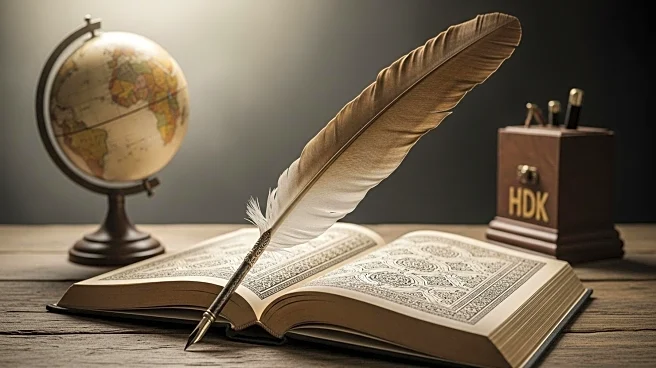What's Happening?
Historian Jung Chang has released a new memoir titled 'Fly, Wild Swans: My Mother, Myself, and China,' which delves into the intertwining of her personal history with China's political upheavals. Born
in 1952 in Yibin to a prominent Communist couple, Chang's parents were often imprisoned for their dissent against Mao Zedong. Her memoir reflects on her journey from China to London in 1978, where she studied Western culture amid Deng Xiaoping's economic reforms. The book highlights her relationship with her mother, who supported her through her academic and literary pursuits, including the success of her 1991 memoir 'Wild Swans' and her 2006 biography of Mao. Chang's mother played a crucial role in shielding her from political repercussions, especially as censorship increased under President Xi Jinping, leading to a halt in family visits to China.
Why It's Important?
Jung Chang's memoir offers a unique perspective on the personal impact of China's political changes over the decades. Her narrative provides insight into the struggles faced by individuals under authoritarian regimes and the resilience required to navigate such environments. The book is significant for its exploration of the relationship between personal freedom and political oppression, highlighting the sacrifices made by Chang and her family. It also serves as a historical account of China's evolution, making it a valuable resource for understanding the complexities of Chinese politics and society. Chang's work continues to contribute to the global discourse on human rights and freedom of expression.
What's Next?
The release of 'Fly, Wild Swans' may spark discussions on the current state of political freedom in China, especially under President Xi Jinping's leadership. It could lead to increased interest in Chang's previous works and further examination of China's historical and contemporary political landscape. Literary circles and human rights organizations might use the memoir as a catalyst for advocating for greater freedom of expression and political reform in China. Additionally, Chang's insights could influence future scholarly research on China's political history and its impact on individual lives.
Beyond the Headlines
Jung Chang's memoir not only recounts historical events but also raises ethical questions about the role of family and personal relationships in political resistance. It challenges readers to consider the moral complexities faced by individuals living under oppressive regimes and the choices they must make to protect themselves and their loved ones. The book may also inspire discussions on the cultural dimensions of political dissent and the ways in which personal narratives can shape public understanding of historical events.










